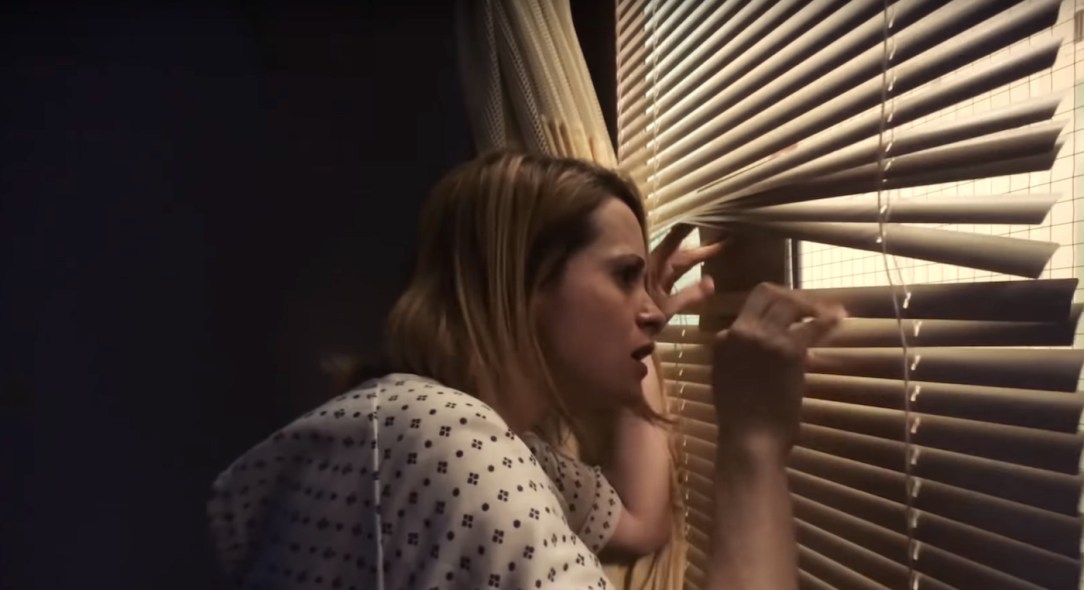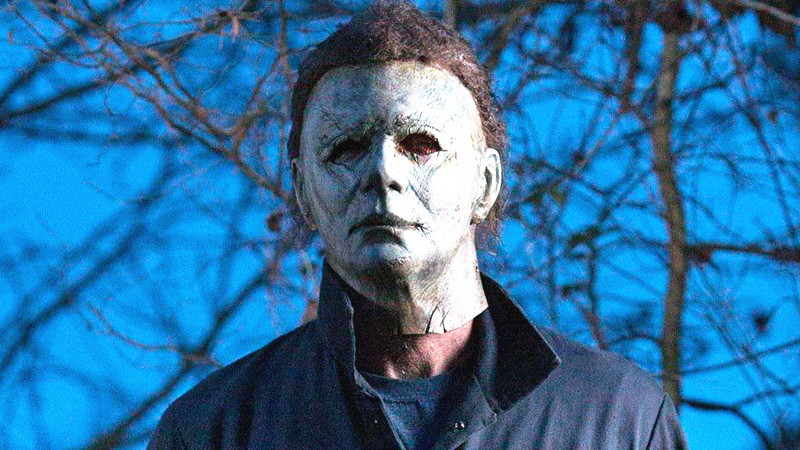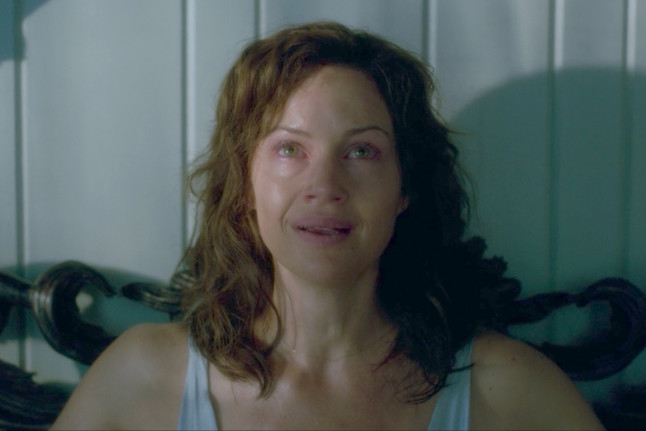6. Unsane (2018)

A young woman named Sawyer Valentini is struggling to move on with her life after escaping from an obsessed stalker, leaving her hometown, friends, and family behind. Confiding in a therapist about her feelings of depression and anxiety, Sawyer is manipulated into committing herself to a psychiatric hospital that will not let her go until her insurance company stops paying. As her anger and confusion lead to violent outbursts that extend her time at the hospital, things take a turn for the even-worse when Sawyer’s stalker lands a job as an orderly. Since she is nothing more than another inmate in the loony bin, nobody believes her when she claims her stalker is out to harm her.
Not only an indictment against the incompetence and greed of certain state hospitals, Unsane also explores the ways in which women can easily lose their autonomy as soon as they say the wrong thing. Once Sawyer allows herself to express her true feelings, she’s instantly labeled a suicide risk. If she opens her mouth about the cruelty of being tricked into committing herself, she’s seen as dangerous and uncooperative. When she lashes out against a fellow inmate taunting her, her observation is extended to another 10 days.
At one telling point, Sawyer makes a phone call to the police about her situation, and a snarky receptionist informs her hundreds of patients make that same claim every day. “But those are from crazy people,” Sawyer naively responds.
Unsane tackles the most common fear of every woman living in the world in 2023: telling their story and being dismissed, gaslighted, and subjected to further abuse.
7. The Silence of the Lambs (1991)

A simple shot in the first 10 minutes of Jonathen Demme’s Oscar/Grand Slam-winning masterpiece expertly – and succinctly – summarizes what it feels like to be a woman working in a predominantly male-oriented profession. Clarice Starling, a young, petite FBI agent gets inside an elevator surrounded by men, who all look down on her with irritated expressions, as if to say, “Ugh, look at this little girl. What is she doing here? Baking cupcakes for all of us, I hope.”
When her boss sends her on an assignment to interview Hannibal “The Cannibal” Lecter, a renowned psychiatrist-turned-cannibalistic serial killer, to obtain insight into the mind of another murderer who abducts women and wears their skin as suits, Clarice forms an unlikely – and endlessly enthralling – bond with the intelligent, perceptive, deceptively charismatic cannibal.
Apart from that aforementioned elevator shot, Demme drives home the struggle for Clarice to succeed in multiple circumstances. Left alone by her boss with the nude corpse of Buffalo Bill’s first-found victim and a horde of police officers, Clarice looks around the room to find every male face gawking at her in disgust and disapproval. Or is this just how she imagines them staring at her, perceiving her as less than them for her femininity? When she orders them all out of the room so the medical examiner and she may observe the body, initially none of the men budge. It takes a second command for them to get the message.
Clarice Starling remains a shining example of a strong female hero in cinema, never once demanding respect, but rather commanding it through sheer force of her intellect, tenacity, and courage.
8. Halloween (2018)

On first glance, it may seem odd to refer to an installment in the Halloween franchise as “socially conscious”, but director/co-writer David Gordon Green, along with Danny McBride, subverts such a dismissive reaction with his direct follow-up to John Carpenter’s legendary 1978 seasonal classic.
After surviving a vicious encounter with Michael Myers at the age of 17, Laure Strode has evolved over the last 40 years into a bitter, hardened, gun-toting survivalist hellbent on watching Myers take his final breath in her presence. However, her lifetime of preparation and paranoia about her would-be killer’s escape has had a toxic effect on her relationship with her now-grown daughter, Karen, and 17-year-old granddaughter, Allyson. The former has cut off contact with her mother almost entirely, while the latter aches to forge a bond with the grandmother she never got to know.
Of course, Michael does make his escape on the titular holiday (when else?) and gets back to doing what he does best (stabbings, slashings, stranglings, impalements, you name it), but what sets this sequel apart from its predecessors is the intimate exploration Green and McBride take on Laurie Strode’s life. Here is a woman so traumatized by her ordeal as a teenager that she can’t even hold onto a marriage (twice divorced) and is forbidden from making contact with her own family. She may live in a large house surrounded by protective alarms, security cameras, and every type of gun known to man, but she’s all alone in it.
9. Gerald’s Game (2017)

What commences as a relaxing (and kinky) weekend getaway for a longtime married couple quickly sours into a nightmare when Jessie Burlingame finds herself handcuffed to a bedpost after her husband drops dead on the floor from a Viagra-fueled heart attack. Armed with nothing more than a glass of water and dress tag at her disposal, and with nobody coming by the lake house for a long time, Jessie must use her keen intellect to figure out a way to free herself. But that entails more than just sliding her hand free from the cuff.
Modern horror maestro Mike Flanagan, working in tandem with a career-best Carla Gugino, crafts a breathlessly tense, layered, heart-rending, and ultimately empowering horror tale about one woman fighting for her literal survival while simultaneously liberating herself from a lifetime of sexual and psychological abuse at the hands of men, beginning with none other than her father. The handcuffs become a potent metaphor for the toxic masculinity Jessie has been defined and controlled by her entire life, and that she must rid herself of in order to find the happiest, most independent version of herself.
10. Get Out (2017)

A 26-year-old black photographer named Chris is getting ready to meet the parents of his white girlfriend, Rose, in the countryside. Only problem is (at least for now) Rose didn’t exactly disclose her beau’s color to her affluent folks, so obviously he’s riddled with anxiety that they won’t take the news lightly. But it’s perfectly okay, Rose assures him. “My dad would’ve voted for Obama for a third term if he could have. Like, the love is so real.”
Once they arrive, following the ominous collision with a deer in the road, Chris is greeted with overtly gregarious smiles and hugs by Dean, a neurosurgeon, and his wife, Missy, a hypnotherapist. As the day turns to night, however, things take a decidedly darker turn, commencing with the arrival of Rose’s unabashedly creepy brother, Jeremy, who utters unsettling “compliments” about Chris’ supposedly superior genetic makeup and beastly physique.
Transitioning from sketch comedy to mind-blowingly original horror, debuting writer-director Jordan Peele explodes onto the scene and leaves his distinctive mark with a blisteringly funny, deliciously uncomfortable, conceptually terrifying critique of modern American race relations, in particular interracial prejudice.
The villains of Peele’s script are not the redneck, rifle-proud, buck-toothed racists we would expect from a more traditional racial satire. Instead, they’re well-educated, soft-spoken, deceptively kindhearted human beings who are so pleased with themselves for displaying tolerance toward a person of color that they utterly fail to understand how racially insensitive and discomforting their remarks actually are.
By shedding a light on this less talked-about form of racism – that which often comes across as benevolent curiosity with a tinge of envy – Peele uncovers a brand of horror far more insidious and unpredictable, with the monsters wearing the warm, comforting mask of liberalism. And once the extent of their sinister plot is revealed, Peele gives an externalized new meaning to the term, “cultural appropriation”.
Author Bio: Jordan Pressler is a contributory writer on Fanon Wiki, a fiction-oriented encyclopedia where he has currently published four original screenplays, and the creator of Just Sayin, a movie review blog where he primarily discusses and dissects horror films, which has been his lifelong passion since the age of three.